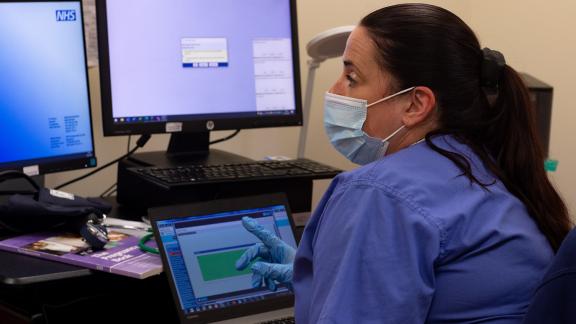Grow your own through staff development
24 January 2023
Authors
-
Faith Sango Assistant Director of Workforce Transformation


We spoke to Faith Sango and Sara Boulton from Derbyshire Community Health Services NHS Foundation Trust about the benefits of upskilling staff within your current workforce. The two trusts, Derbyshire Community Health Services NHS Foundation Trust and Derbyshire Healthcare NHS Foundation Trust have a joint venture agreement on delivering recruitment and development and have witnessed the great impact that a focus on internal staff development can have on progression, and morale.
Our original focus on growing on our own talent developed as we had identified the need to increase our learning disability nurses within our organisations. Numbers of learning disability nurses had been in decline in previous years, and we were swiftly approaching a point where there would not be enough learning disability nurses to support patients. To mitigate this issue, we collaborated with Derby University which was running the first cohort of an MSc in learning disability nursing and advertised this opportunity internally across the two trusts. Those who held a relevant first degree, the required level of maths and English and clinical experience were welcome to apply. Their university fees were funded via the apprenticeship levy, and they received a salary during their learning. This was a successful initiative and all eight successful applicants have now taken up learning disability nurse roles within the integrated care system (ICS).
Whilst the above was a catalyst for change and identified how successful growing our own could be, we have developed further initiatives to show our workforce that our organisations support continued development. We have developed a new rotation model for newly-qualified nurses that will, from September 2022, allow for the first cohort to rotate across the entire system, which includes four trust hospitals as well as a hospice placement. Derbyshire Community Health Services NHS Foundation Trust is leading this on behalf of the ICS. This initiative has generated a significant amount of interest and we are delighted that there is a waiting list for the second intake due to commence in March 2023, which will include social care placements and a fifth NHS organisation. We believe this exemplifies the desire of the workforce to try different settings and upskill themselves as they go.
Working closely with Derby College, we are introducing an apprentice-first approach with a talent pipeline taking shape to employ those who have completed BTECs, T Levels in health and social care or individuals who are new to care as trainee healthcare assistants with the anticipation that, in due course, they will become nursing associates. Nursing associates are then offered the opportunity to train to become either a learning disability nurse, mental health nurse or an adult nurse. To further develop this and to help mitigate nursing vacancies nursing associates are being offered an 18-month top up after they have completed their training to become registered nurses.
Through this system-wide approach, we have also been able to increase cohort numbers for allied health professional apprenticeships with a particular focus on physiotherapists, occupational therapists and podiatry. By putting in the support to ensure that apprentices or students on placements have a successful experience, we believe our staff will be more likely to consider further employment within the organisation, whilst also being assured that we have candidates who we know would be an asset to our workforce.
However, it has become clear to us that all these opportunities are only feasible if the individuals who are engaged in training or upskilling are offered support mechanisms to help them achieve their goals. We have found that support is vital for those undertaking the MSc nursing programmes, particularly if people have been out of education for a while. We have since dedicated an operations manager to support learning disability nurse apprentices. Many of our staff had not been in education for a long time and found the transition back into education challenging, which was only exacerbated by this happening during the pandemic. Since introducing an operations manager and support from a clinical facilitator, the cohort has felt they have a point of contact to approach with any concerns they may have, which has been reinforced by the introduction of several group HR sessions to offer advice. These sessions answer questions such as what their new terms and conditions might be, where they will be based and other contractual queries.
Continuing to develop our workforce, both to offer career progression and to support recruitment into areas where we have need, is crucially important in a time where there are so many vacancies. By offering our staff opportunities to either change their role or develop within the role we are securing future talent pipelines and sending a positive message that we want to support staff with their career and in turn have them stay within our trusts.
For further information on developing current staff members to become learning disability nurses or how best to ‘grow your own’, contact Faith Sango, Assistant Director of Workforce Transformation, email faith.sango@nhs.net or Sara Boulton, Divisional People Lead, email sara.boulton@nhs.net.
Avon & Wiltshire Mental Health Partnership NHS Trust also recognise the value of growing your own, and have been working with the Open University to explore how their learning disabilities nursing apprenticeship programme can address workforce supply issues. Their flexible approach works well for many of the apprentices, who were previously unable to take time out of work to pursue their ambitions. You can find out more about their successes by reading the case study on the Open University website.
